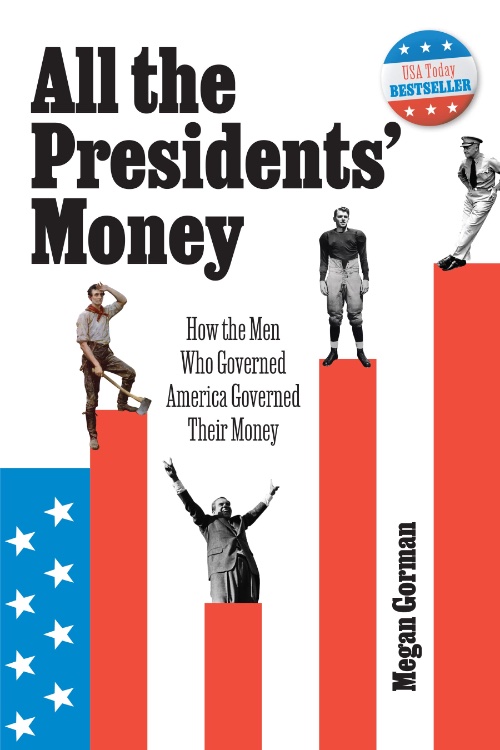From the White House to Your House
by Natasha Wolff | October 2, 2025 7:00 am
We often think of the U.S. presidents[1] as being above the fray. But the truth is, the presidents are just like us—worried about money, trying to keep a budget and chasing the American financial dream. While some presidents like Herbert Hoover and Gerald Ford became wildly successful with money, others like Thomas Jefferson and Joe Biden struggled to sustain their lifestyle. The ability to win the presidency is no guarantee of financial security, although today it’s a much easier path to monetize. In All the Presidents’ Money[2], tax attorney and wealth manager Megan Gorman[3] takes us on a journey to understand the different personal money stories of the presidents. All the Presidents’ Money reveals how some of the greatest leaders are the worst money managers and our least favorite presidents are good at making money. DuJour sat down with Gorman to see how U.S. presidents handled their finances and how we can learn from their successes—and mistakes!
What surprised you while researching this book?
Working with the high net worth clients, I get to see how wealthy people build wealth in this country. So, it’s been a fun journey through the presidents, because some of them were incredibly good at making money and others were not and even the presidents who are ‘supposed’ to be financially successful, were not.
Do you feel that the American Dream has become impossible to attain?
Access to the housing market wasn’t as challenging as it is today. The American Dream is still there, it’s just sometimes harder to access. Financial literacy is incredibly important. Right now, only about half of the states in the U.S. have a financial literacy requirement for high school graduation, which is unbelievable when you consider how important that is for a building block for financial success over time. Most people want their children do better than they did. That has always been the crux of the American dream. And I don’t care if you’re Democrat, Republican or Independent, most people would agree on that. I want people to understand the American Dream is still there, but it’s getting harder to achieve and we really need to come together and have thoughtful discussions about how can we make it easier for people to buy a home and access education without taking out an obscene amount of loans.
Do even billionaires struggle with money?
No matter how successful you are, we all struggle with money. The difference between regular Americans and wealthy Americans is the wealthy Americans have the flexibility and the cushion to make a mistake with their money and be able to pivot away from it, whereas if you’re living paycheck to paycheck, you have a lot less breathing room for a mistake when you make one. And trust me, everybody makes mistakes financially. It’s more about how you rebound from it, right?
Which of the U.S. Presidents was a good saver?
Herbert Hoover grew up in a Quaker household and growing up he learned how to budget, how to function in a community and how to give back. Even though he grew up poor and as an orphan, he learned early on that while he had this amazing ability to make money. And by the way, not only did he make money, he owned gold mines, so he made serious money, he understood that his role in it was to also be in the center of a web of people that he could help, whether it was friends and family or charities, or, helped prevent famines in Europe after the World Wars. Hoover is a great example of giving back.
Is there a President whose legacy surprised you?
Ronald Reagan grew up poor in Illinois, his father was an alcoholic and had a volatile childhood. There are stories of the Reagan family leaving in the middle of the night because they don’t have the money to pay their landlord. But what’s interesting about Reagan and how money shapes him is instead of being cynical or feeling like he can’t win, Reagan looks for positive influences, and he learns that from both his mother and his girlfriend’s father, who taught him a lot about money and budgeting. And so these early negative experiences for Reagan ends up becoming positive ones for him. He learns how to budget, he learns how to be optimistic about money and learns how to bootstrap. There are elements of his early money story that factor in today with what his legacy is in terms of how America should handle its finances.
What was your background with being financially astute?
I grew up middle class in southern New Jersey but, like a lot of presidents, I also went out into the world and wanted to learn and understand how things how things happened. And I was very fortunate, because the first 12 years of my career was spent at a division of Goldman Sachs where I worked with wealthy people. And the thing that I loved most in that that time period of my career was, when we had a new client, we had to learn about their path. And I was always fascinated, when you talk to these CEOs and CFOs, that they often talked about two things: they worked hard and they got lucky. I’ve tried to make all the presidents human, even the ones that I might not have liked politically, I found I came to like them personally, because I could relate at times to the struggles and the and the decisions they had to make.

“All The Presidents Money”
- U.S. presidents: https://dujour.com/style/watches-worn-by-presidents/
- All the Presidents’ Money: https://www.amazon.com/All-Presidents-Money-Governed-America/dp/B0D3628TH4
- Megan Gorman: https://www.simonandschuster.com/authors/Megan-Gorman/227414916
Source URL: https://dujour.com/culture/megan-gorman-all-the-presidents-money/